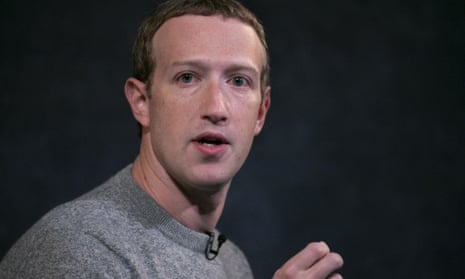Two years after admitting under political pressure that Facebook must do more to prevent disinformation campaigns on its platform, founder Mark Zuckerberg told Fox News on Thursday that the company should step away from regulating online speech.
Zuckerberg’s remarks seemed designed to ingratiate his company to the White House, as Donald Trump escalated a war with rival social media platform Twitter over that company’s efforts to begin factchecking some of Trump’s posts.
“I just believe strongly that Facebook shouldn’t be the arbiter of truth of everything that people say online,” Zuckerberg told Fox News. “Private companies probably shouldn’t be, especially these platform companies, shouldn’t be in the position of doing that.”
Twitter slapped a factcheck link on two Trump tweets this week in which the president spread lies about the integrity of mail-in voting. Trump accused Twitter of censorship – in a tweet – and has announced plans to issue an executive order that could strip social media companies of protections against liability for user content.
In his Fox News interview, Zuckerberg appeared to move to head off the possibility. Since its platform was hijacked by foreign propaganda campaigns and harvested for private data by malicious actors during the 2016 election season, the company has stepped up government lobbying campaigns in Washington, Britain and worldwide.
To assist the effort, Zuckerberg hired and promoted Joel Kaplan, a Republican operative in Washington, and Nick Clegg, Britain’s former deputy prime minister, the New York Times reported.
Trump, who is facing an uphill re-election bid, has not criticized Facebook for months. Trump’s campaign manager, Brad Parscale, credited a targeted advertising campaign on Facebook as a crucial tool in Trump’s 2016 win. The 2020 Trump campaign is reprising the effort.
But the Trump campaign was not the only entity using Facebook to help Trump win in 2016. In March 2018, a whistleblower revealed to the Observer that Cambridge Analytica, a data analytics firm that worked with Trump’s election team and the winning Brexit campaign, harvested millions of Facebook profiles of US voters for use in targeting political ads.
The company later acknowledged that hackers had scraped information from profiles of more than 2 billion users worldwide.
Those developments saw a contrite Zuckerberg summoned before Congress in the spring of 2018, where he apologized for allowing imposter accounts with foreign backers to target American voters with advertising meant to polarize political opinion.
“It’s clear now that we didn’t do enough to prevent these tools from being used for harm,” Zuckerberg said then. “That goes for fake news, foreign interference in elections, and hate speech, as well as developers and data privacy.”
“I think there are a number of areas of content we need to do a better job of policing on our service,” Zuckerberg added.
